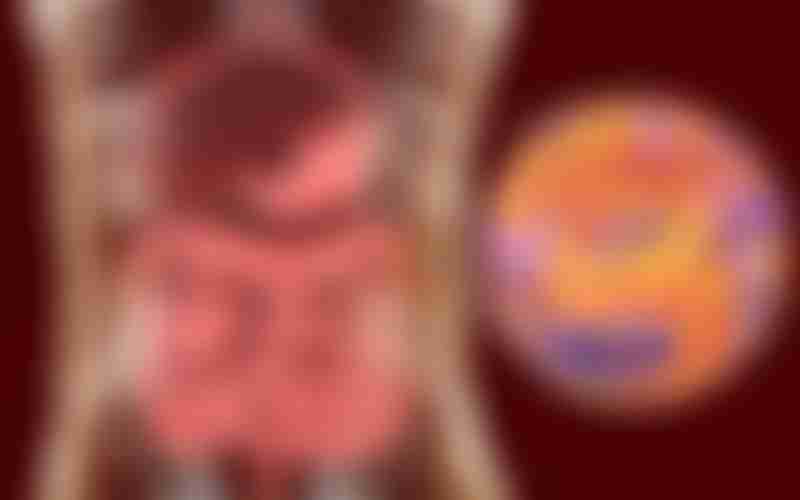Stomach Cancer Risk: Can H. pylori Cause Cancer?

Source: Shutterstock
Helicobacter pylori (also known as H. pylori) is a type of gut bacteria that infects the lining of the stomach. It can damage your stomach tissue, causing pain and inflammation.
- H. pylori is one of the strongest risk factors for certain types of stomach cancer
- Successful H. pylori treatment with antibiotics can significantly reduce the risk of developing stomach cancer
H. pylori causes: How do you get H. pylori?
H. pylori is contagious, and can be passed person to person via direct contact with bodily fluids (e.g. saliva, vomit or stool). You can also get H. pylori through contaminated food or water.
H. pylori symptoms
The symptoms of H. pylori are similar to stomach ulcers or gastritis. Frequently seen symptoms include:
- Pain, aches or burning pain in the stomach (especially if it worsens on an empty stomach)
- Nausea or vomiting
- Appetite loss
- Frequent burping or bloating
- Unintended weight loss
Prevalence of H. pylori in the US
H. pylori is much more common among Asian populations and in Eastern and Southern Europe. Meanwhile, the overall incidence of H. pylori-related stomach cancer in the US and Europe has declined. However, the prevalence of H. pylori in Black and Hispanic American communities is on the rise in the US.
Health conditions or illnesses associated with H. pylori infection
H. pylori causes severe inflammation of the stomach when it infects gastric epithelial cells within the stomach lining. This condition is called gastritis. Prolonged gastritis can lead to the development of ulcers, which are painful, bleeding sores. Some diseases linked to H. pylori infection include:
- Chronic gastritis, which may be followed by metaplasia and dysplasia
- Autoimmune gastritis
- Ulcers in the stomach (also known as peptic ulcers)
- Ulcers in the duodenum (first part of the small intestine)
- Gastric mucosa-associated lymphoid tissue (MALT) lymphoma
- Gastric adenocarcinoma (both diffuse and intestinal type)
H. pylori as a stomach cancer risk factor
H. pylori is known to be the main risk factor for stomach cancer. Notably, the World Health Organization (WHO) has classified H. pylori as a Class I (definite) carcinogen since 1994. However, while there are multiple strains of H. pylori, not every strain causes diseases like gastritis or stomach cancer. Most people will not experience symptoms or illness while infected.
It’s also important to note that this bacterium is only one possible cause of stomach cancer. Infection with H. pylori could heighten your cancer risk when combined with other risk factors like:
- Smoking
- Obesity
- Heavy alcohol consumption
- Diet low in fruits and vegetables
H. pylori cancer symptoms
While most people with H. pylori infection don't develop stomach cancer, it still remains a risk factor. Stomach cancer is often found in later stages, because symptoms don’t appear until the disease is advanced. Paying attention to your body and recognizing the symptoms of stomach cancer can help with early detection.
How does H. pylori cause stomach cancer?

Illustration of H. pylori bacteria in a human stomach. Source: Kateryna Kon/Science Photo Library
Successful, pathogenic (disease-causing) H. pylori strains carry a cag pathogenicity island (cagPAI) in their genome. This part of the genome encodes a needle-like injection system that allows the bacterium to:
- Attach to the stomach lining
- Inject and deliver bacterial cancer-promoting protein (e.g. CagA) into stomach cells
- Induce a strong inflammatory response
- Damage the stomach lining and prevent wound healing that results in ulcer formation through prolonged, uncontrolled inflammation
In gastric epithelial cells within the stomach lining, CagA and other genes or proteins from H. pylori can participate in several signalling pathways that control cell growth and cell invasion.
“With H. pylori, you have an infection, which causes inflammation, then healing, then more inflammation. Over time, this cycle of constant cell regeneration can result in mistakes that lead to cancer.
The whole process of stomach cancer risk associated with H. pylori is one of inflammation." — Dr Patrick Lynch, Department of Gastroenterology Hepatology and Nutrition, Division of Internal Medicine, MD Anderson Cancer Center
H. pylori tests and treatments
Fortunately, the risk of developing stomach cancer can be greatly reduced by eradicating H. pylori infection. With the help of H. pylori tests, infections can be detected early. These tests may include a breath test, stool test, blood test or upper endoscopy.
The H. pylori breath test, also known as the urea breath test, is considered one of the most accurate non-invasive methods to test for H. pylori .
After discovery of the infection, H. pylori treatment usually requires antibiotic use. For more information, the following video covers a range of available H. pylori treatments and tests.